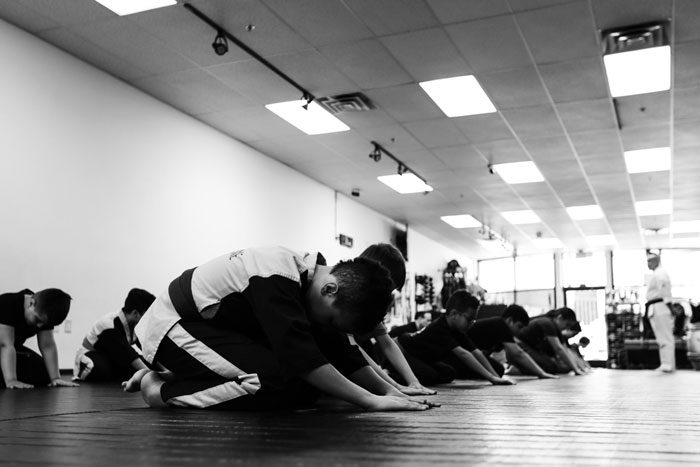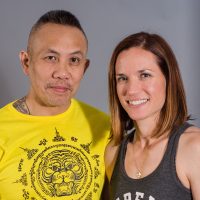The following is adapted from Step on The Mat.
In our everyday lives, we’re often unaware of our own movements. When we stand up from sitting or lying down, we’re not conscious of where we put our feet or our weight. When we walk around, we don’t think about our balance—about the motion and momentum in our bodies.
In martial arts, we are aware of these movements. We acknowledge how we move, who we move with, who we learn from, and how we make our way in the world. We acknowledge our respect and our commitment. As martial artists, we acknowledge everything, and are aware of everything. We’re aware of ourselves.
We practice that acknowledgment and awareness with the bow.
In martial arts, you will learn all kinds of skills that can enable you to defend yourself or lead you to victory in competition. But those skills and lessons can also transcend the dojo and apply to your everyday life.
And the first skill is the bow.
What Bowing Teaches Us
Why can’t more of us use this practice in the outside world? How each moment unfolds in your life depends on your attitude, your commitment to what you believe in, and your awareness of your situation. By bowing, we remind ourselves that we aren’t martial artists only in the dojo, but everywhere and at every moment.
Acknowledgment
A bow in martial arts is the same as a handshake in America. It’s a way of offering respect and acknowledgment.
Acknowledgment is important. We often forget this and take the important things in life for granted. Or we do things we know we’re supposed to do, but we fail to really acknowledge them; we just go through the motions. Worse yet, sometimes we find excuses for our problems instead of solutions to them.
When we bow, we take the time to acknowledge the important things in life—our responsibilities, our commitments, and the people we care about.
You bow to your partner to acknowledge them and give them respect. You bow to the dojo to acknowledge your training. Inwardly, you may bow to your girlfriend or boyfriend before you take them on a date to acknowledge the importance of the moment and that your date deserves your respect. You bow before you step on the mat to acknowledge that you are there to train, not to simply go through the motions.
When we practice bowing, we practice acknowledgment and offering respect.
Commitment
When you bow, you make a commitment. It’s not just a movement, it’s the way you signal to yourself that you are committed to the moment.
Let’s say, for example, that a student of mine has just been dumped by his girlfriend. He’s depressed, and he keeps thinking of her and how sad he is about what happened. Then he enters the dojo, and the first thing he does is bow. He is expressing his commitment. He’s expressing it to the dojo itself, to the training partners he has there, to his sensei—but he is also expressing to himself that he is here to train. Everything bothering him is going to have to wait a while, because he has learned to commit himself to his training. He has learned the true meaning of the bow.
Committing to Choices
Imagine I’m driving along the highway and see a sign telling me my lane is about to end. Then I see another car in the other lane, coming up behind me. As a driver, I have a choice to make. I can slow down to let that car go ahead of me, or I can move over into another lane myself first.
Now imagine I let the other car go in front of me. I realize that this person is an incredibly slow driver. My instinct may be to complain. But if I truly understand commitment, I know that complaining isn’t really an option. I chose to let that driver go ahead of me. I can’t expect that car to go at my speed just because I gave way.
Life is all about choices. In every situation, you choose in or out. If you choose in, you have to accept the consequences of the decision you’ve made.
The same dynamic applies in a martial arts gym. Imagine I’m training with someone new. They become my partner. Because they’re new, they don’t know as many concepts or details as I do. It’s my responsibility to know what they’re capable of. In that scenario, I have to ask myself if I want that person to train better or not. Maybe I wish I had a better partner because I’d wanted a different kind of sparring session. But what I wanted a few minutes ago no longer matters, because I’ve made my choice.
In life, we spar all the time—at school, on the road driving. We make our choices and we must stand by them. We don’t always get to spar the way we want, but we have to commit to the choices we have made and deal with the consequences of them. Sometimes that means we have to be polite when it’s tough or support others when we’re more interested in ourselves. But if the situation we’ve chosen calls for politeness or supporting others, we have to honor that.
Always ask yourself: do you want to be a better person? If you do, you need to inspire and be helpful to other people. Discouraging others only creates more hate in both of your lives. It does no good to honk at a slow driver just as it does no good to spar too hard with a beginner. Nobody needs more hate.
Staying Committed
When a student comes into my gym, I say, “don’t forget what you bow yourself into.”
I always remind them because I never want them to forget about the commitment they’re making. One of the first lessons I teach students is how to have their feet together in what we call the attention stance. With their next movement, they bow, and go into the defense stance, with one foot forward and one foot backward, similar to the warrior pose in yoga.
I never want students to forget the commitments they make. When my students go into the commitment stance, I ask them what the word dojo means. As soon as they define dojo, I ask them to give me their word that they will take their training seriously. If they say they’re going to train, I want them to commit to training.
In all areas of your life, stay conscious of your commitments and honor them, either literally or figuratively, with the bow.
For more advice on martial arts, you can find Step on the Mat on Amazon or visit www.steponthemat.com.
Ninja Nguyen started his martial arts journey when he was four years old, growing up in a small fishing village in Vietnam. He continued to train in refugee camps, where martial arts served as his guiding light while he struggled to learn English in unfamiliar classrooms, preparing to come to America. Ninja originally worked in security for nightclubs before finally opening his own dojo and building the life he has today. A devoted husband and father of three, he is the owner of Xtreme Ninja Martial Arts Center in Boston, which currently trains more than 500 students.












Read 4 comments and reply